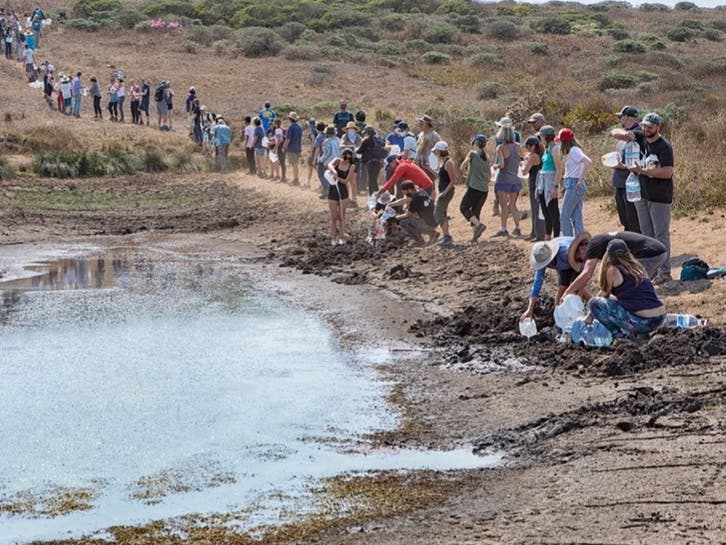via Patch
by Michelle Rotuno-Johnson

POINT REYES, CA— The historic drought in Marin County continues to affect a rare species of elk.
Last weekend, nearly a hundred people carried water to replenish the drinking supply for tule elk at Point Reyes National Seashore that are dying in the drought conditions.
Volunteers hiked six miles round trip on Saturday, carrying gallon jugs of water to provide the animals at Tomales Point with more to drink. The water drop was organized in part by TreeSpirit Project, Save The Elk, and In Defense of Animals.
Tule elk are native to California and were close to dying out until the late 1900s. The National Park Service estimates there are 5,700 elk across the Golden State as of 2020.
The park service says 152 elk from the Tomales Point herd died in 2020. The NPS says the animals are dying of poor nutrition, not of thirst, in the ongoing drought conditions and adds the elk population “has fluctuated up and down with changing environmental conditions” since the 1990s.
Activist Jack Gescheidt said this is the fifth water drop volunteers have done since last August. He said activists are asking the park to put in more water troughs and remove the fence from around the elk habitat in Tomales Point.
“The park says, ‘well, it’s natural, it’s a drought. We say it’s not natural if there are fences out,'” said Gescheidt, who founded TreeSpirit Project. “It’s basically a big zoo.”
The elk at Limantour and Drakes beaches roam free, but the Tomales Point elk are fenced in. The park service also says they are unable to remove the fence around the elk enclosure because the 1998 Tule Elk Management Plan specifically directs NPS to maintain it. The Elk Management Plan says removing the fence at Tomales Point “will be considered if and when ranching ceases on the adjacent lands” and mentions possible damage to ranching lands and the elk habitat if this fence is removed.
Private cattle ranchers and dairies lease part of the parklands, as they have since the park was established. Gescheidt said not only do the cattle drink a lot of precious water, but they also produce a large amount of waste on park property.
“It’s a public park, they weren’t supposed to be there in perpetuity,” he said.
“It’s completely enraging because it’s so egregiously wrong.”
In June, the Harvard Law School Animal Law and Policy Clinic filed a lawsuit saying the National Park Service is being negligent by keeping the Tomales Point elk in an enclosure. The NPS has not commented publicly about this weekend’s water drop, citing the lawsuit.
Filed in: In the News, Legal & Policy Work
Tags: Animal Law & Policy Clinic, Animal Law and Policy Clinic
Contact Office of Clinical and Pro Bono Programs
Website:
hls.harvard.edu/clinics
Email:
clinical@law.harvard.edu